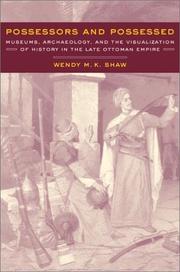| Listing 1 - 2 of 2 |
Sort by
|

ISBN: 0520928563 9786612356803 1282356801 1597348244 9780520928565 0585468540 9780585468549 9780520233355 0520233352 9781597348249 6612356804 0520233352 9781282356801 Year: 2003 Publisher: Berkeley, Calif. University of California Press
Abstract | Keywords | Export | Availability | Bookmark
 Loading...
Loading...Choose an application
- Reference Manager
- EndNote
- RefWorks (Direct export to RefWorks)
Possessors and Possessed analyzes how and why museums-characteristically Western institutions-emerged in the late-nineteenth-century Ottoman Empire. Shaw argues that, rather than directly emulating post-Enlightenment museums of Western Europe, Ottoman elites produced categories of collection and modes of display appropriate to framing a new identity for the empire in the modern era. In contrast to late-nineteenth-century Euro-American museums, which utilized organizational schema based on positivist notions of progress to organize exhibits of fine arts, Ottoman museums featured military spoils and antiquities long before they turned to the "Islamic" collections with which they might have been more readily associated. The development of these various modes of collection reflected shifting moments in Ottoman identity production. Shaw shows how Ottoman museums were able to use collection and exhibition as devices with which to weave counter-colonial narratives of identity for the Ottoman Empire. Impressive for both the scope and the depth of its research, Possessors and Possessed lays the groundwork for future inquiries into the development of museums outside of the Euro-American milieu.
Museums --- Public institutions --- Cabinets of curiosities --- Collection management --- History. --- History --- Collection management&delete& --- E-books --- Museology --- History of civilization --- History of Southern Europe --- anno 1800-1899 --- Turkey --- 1874 antiquities law. --- abdlaziz. --- abdlhamid ii. --- abdlhamid. --- antique weapons. --- antiquities. --- archaeology. --- artifacts. --- cameras. --- church of the hagia irene. --- collection management. --- collection. --- colonial narratives. --- conquest. --- display. --- empire. --- history. --- identity. --- imperial armory. --- imperial museum. --- imperialism. --- islam. --- middle east. --- military storehouse. --- military. --- museum administration. --- museum exhibits. --- museums. --- national identity. --- ottoman empire. --- ottoman museums. --- railroads. --- relics. --- spoils of war. --- spolia. --- technology. --- turkey. --- turks. --- war.
Book
ISBN: 0691227888 Year: 1996 Publisher: Princeton, N.J. : Princeton University Press,
Abstract | Keywords | Export | Availability | Bookmark
 Loading...
Loading...Choose an application
- Reference Manager
- EndNote
- RefWorks (Direct export to RefWorks)
This book is the result of a long and fruitful conversation among practitioners of two very different fields: ancient history and political theory. The topic of the conversation is classical Greek democracy and its contemporary relevance. The nineteen contributors remain diverse in their political commitments and in their analytic approaches, but all have engaged deeply with Greek texts, with normative and historical concerns, and with each others' arguments. The issues and tensions examined here are basic to both history and political theory: revolution versus stability, freedom and equality, law and popular sovereignty, cultural ideals and social practice. While the authors are sharply critical of many aspects of Athenian society, culture, and government, they are united by a conviction that classical Athenian democracy has once again become a centrally important subject for political debate.
Democratie. --- Democratie --- Democracy. --- Democracy --- Histoire. --- History. --- Athenes (Grece) --- Greece --- Politique et gouvernement --- Congres. --- Alcibiades. --- Anti-Federalists. --- Archilochus. --- Areopagus. --- Bill of Rights (U.S.). --- Bourdieu, P. --- Cambridge School. --- Dorians. --- Erechtheus. --- Federalists (U.S.). --- James, William. --- Peisistratus. --- Peloponnesian War. --- and gender. --- associations, voluntary. --- autochthony. --- burials, and equality. --- carnival: and democracy. --- castration, and sacrifice. --- citizenship: and capitalism. --- civil society. --- colonial narratives. --- communitarianism. --- competitiveness. --- corruption, and rhetoric. --- decision making: and citizenship. --- dialectic. --- discrimination, and equality. --- education: and action. --- elegy, and ideology. --- eleutheroi. --- ephebic oath. --- exclusion: and autochthony. --- foundation tales. --- foundationalism. --- free speech. --- gender: and citizenship. --- goals: of corporations. --- habrosunē. --- homoioi. --- imaginary: Athenian. --- individualism. --- kinaidoi. --- kingship. --- land: and citizenship. --- liberal democracy. --- litigation. --- management: and knowledge. --- megaloprepeia. --- mystery cults. --- navy: and citizenship. --- oral poetry, and heroism. --- ostracism.
| Listing 1 - 2 of 2 |
Sort by
|

 Search
Search Feedback
Feedback About UniCat
About UniCat  Help
Help News
News